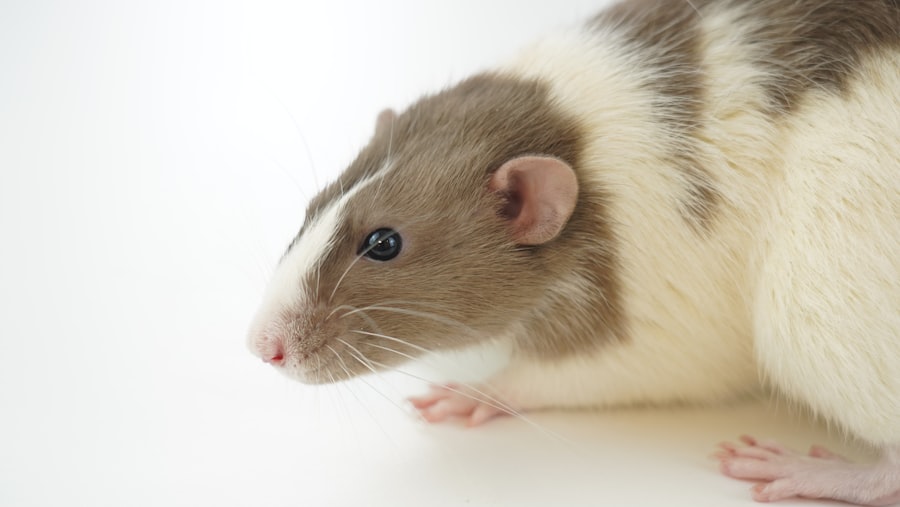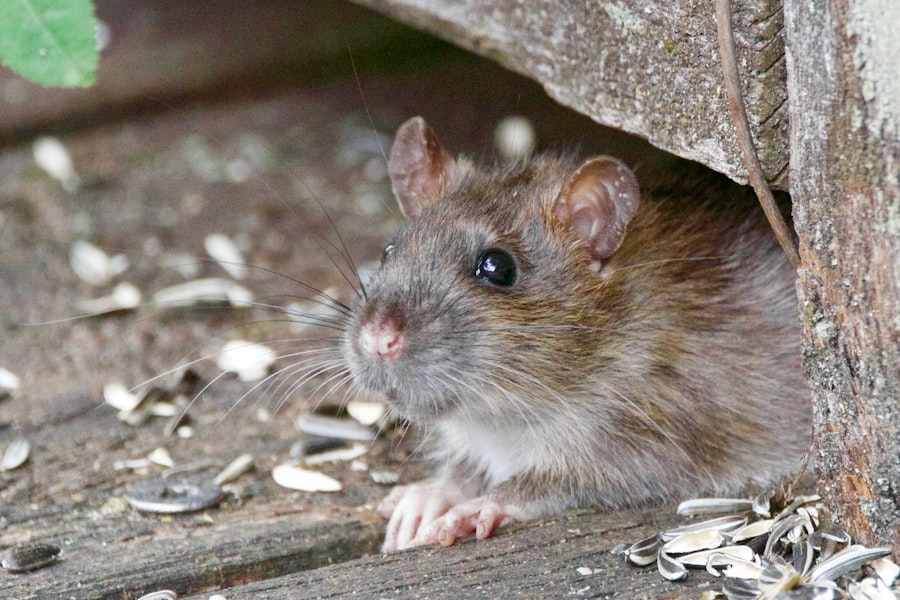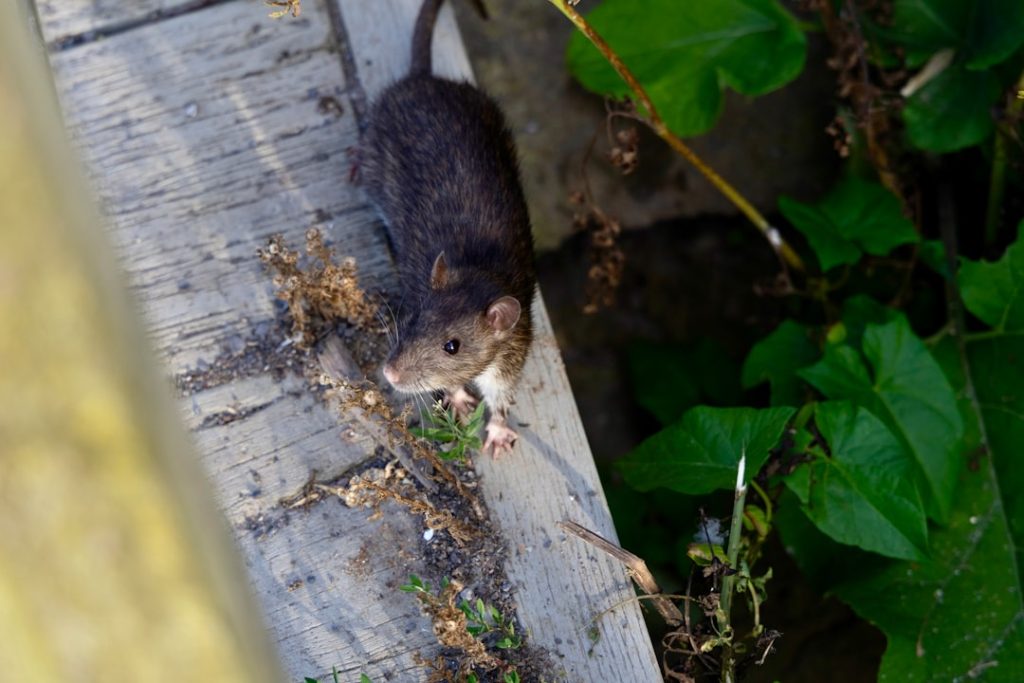Rats present significant risks to chickens and their coops. These rodents can transmit diseases such as salmonellosis to chickens, causing symptoms like diarrhea, lethargy, and reduced egg production. Rats consume large amounts of chicken feed, potentially leading to food shortages for the flock.
Their ability to chew through various materials, including wood, plastic, and metal, can cause extensive damage to coops, compromising the chickens’ safety and security. The presence of rats in chicken coops can result in numerous health and safety issues for the birds, necessitating proactive measures by chicken owners to prevent infestations. Rats are prolific breeders, with a single female capable of producing up to 12 litters of 6-8 pups annually.
This rapid reproduction rate means that a minor rat problem can quickly escalate into a severe infestation if not addressed promptly. Chicken owners must remain vigilant and take immediate action upon noticing any signs of rat activity in or around the coop. Understanding the potential dangers rats pose to chickens is crucial for implementing effective protective measures and ensuring the flock’s well-being.
Table of Contents
- 1 Securing the coop: Tips for rat-proofing your chicken coop
- 2 Proper food storage: Preventing rat access to chicken feed
- 3 Natural deterrents: Using plants and herbs to repel rats
- 4 Trapping and removal: Effective methods for catching and removing rats
- 5 Maintaining cleanliness: The importance of sanitation in keeping rats away
- 6 Seeking professional help: When to call in pest control experts for rat infestations
- 7 FAQs
Key Takeaways
- Rats pose a serious threat to chickens, as they can spread diseases, steal eggs, and even attack young chicks.
- To rat-proof your chicken coop, seal all entry points, use hardware cloth instead of chicken wire, and keep the coop clean and clutter-free.
- Store chicken feed in metal containers with tight-fitting lids to prevent rats from accessing it.
- Planting mint, lavender, and other herbs around the coop can help repel rats naturally.
- Set up traps and regularly remove any captured rats to keep the infestation under control.
Securing the coop: Tips for rat-proofing your chicken coop
Inspecting the Coop Structure
One of the first steps in rat-proofing the coop is to inspect the entire structure for any potential entry points that rats could use to gain access. This includes checking for gaps or holes in the walls, windows, doors, and vents.
Sealing Entry Points and Using Durable Materials
Any openings should be sealed with sturdy materials such as hardware cloth or metal flashing to prevent rats from entering. Additionally, it is important to ensure that the coop is constructed with durable materials that rats cannot easily chew through, such as solid wood or metal. Regular maintenance and repairs should be conducted to address any wear and tear that could create vulnerabilities for rat entry.
Maintaining a Clean and Clutter-Free Environment
Another important aspect of rat-proofing the coop is to keep the surrounding area clean and free of debris that could provide hiding spots for rats. This includes removing any piles of wood, brush, or other clutter near the coop that could serve as harborage for rats. Additionally, it is crucial to keep the area around the coop free of food scraps and spilled feed, as these can attract rats and encourage them to stick around. By maintaining a clean and clutter-free environment around the coop, chicken owners can reduce the likelihood of rat infestations and create a less hospitable environment for these pests.
Proper food storage: Preventing rat access to chicken feed

Proper food storage is crucial in preventing rats from accessing chicken feed and being attracted to the coop. One of the most effective ways to store chicken feed is in secure, rodent-proof containers that rats cannot easily access. This includes metal bins with tight-fitting lids or heavy-duty plastic containers with locking mechanisms.
It is important to store feed off the ground and away from walls to further deter rats from reaching it. Additionally, any spilled feed should be promptly cleaned up to eliminate a potential food source for rats. In addition to securing feed storage containers, it is important to regularly inspect them for signs of damage or wear that could compromise their integrity.
Any holes or cracks should be promptly repaired to prevent rats from gaining access to the feed. Furthermore, it is advisable to limit access to the feed storage area by installing barriers such as wire mesh or fencing to prevent rats from reaching the containers. By implementing proper food storage practices, chicken owners can significantly reduce the risk of rat infestations and protect their chickens’ food supply.
Natural deterrents: Using plants and herbs to repel rats
Natural deterrents such as plants and herbs can be effective in repelling rats from the chicken coop and its surroundings. Certain plants, such as mint, lavender, and marigolds, are known for their ability to repel rodents due to their strong scents and natural compounds that rats find unpleasant. Planting these types of herbs and flowers around the coop can help create a natural barrier that deters rats from approaching.
Additionally, some plants have been found to contain compounds that are toxic or irritating to rats, further discouraging their presence. In addition to planting rat-repelling vegetation, using essential oils derived from plants such as peppermint, eucalyptus, or citronella can also be an effective natural deterrent. These oils can be diluted and sprayed around the coop and its perimeter to create a scent barrier that rats find offensive.
Furthermore, some herbs such as rosemary and thyme can be used in sachets or bundles and placed in strategic locations around the coop to repel rats with their strong aromas. By incorporating natural deterrents into the coop environment, chicken owners can help discourage rat activity and create a more inhospitable environment for these pests.
Trapping and removal: Effective methods for catching and removing rats
When dealing with a rat infestation in or around the chicken coop, trapping and removal are often necessary measures to effectively address the problem. There are various types of traps available for catching rats, including snap traps, live traps, and electronic traps. Snap traps are a traditional method that uses a spring-loaded mechanism to quickly kill rats when triggered.
Live traps are designed to capture rats alive so they can be released elsewhere, while electronic traps deliver a lethal shock to rats when they enter the trap. When setting traps, it is important to place them in areas where rat activity has been observed, such as near feeding areas or along travel routes. Baiting traps with enticing foods such as peanut butter, nuts, or dried fruit can increase their effectiveness in attracting rats.
It is crucial to regularly check traps and remove any captured rats promptly to prevent odors and potential health hazards. In addition to trapping, it is important to take measures to prevent new rats from entering the coop once existing ones have been removed. This includes sealing off entry points and implementing proactive measures such as maintaining cleanliness and proper food storage practices.
By combining trapping and removal with preventative measures, chicken owners can effectively manage rat infestations and protect their flock.
Maintaining cleanliness: The importance of sanitation in keeping rats away

Eliminate Food Sources
Regularly sweeping and removing debris from the coop floor, as well as keeping feeding areas tidy, can help eliminate potential food sources for rats.
Maintain a Clean Environment
In addition to cleaning the interior of the coop, it is essential to pay attention to the surrounding area. This includes keeping grass trimmed, removing overgrown vegetation, and clearing away any piles of wood or debris that could provide hiding spots for rats.
Proper Waste Management
Proper waste management is vital in preventing rat activity. Chicken droppings should be promptly removed from the coop area and properly disposed of to eliminate potential food sources for rats. By implementing good sanitation practices and maintaining cleanliness both inside and outside the coop, chicken owners can create an environment that is less hospitable to rats and better protect their flock.
Seeking professional help: When to call in pest control experts for rat infestations
In some cases, rat infestations in or around the chicken coop may require professional intervention from pest control experts. If efforts to address the infestation using preventative measures, trapping, and removal have proven ineffective, or if the infestation is particularly severe, it may be necessary to seek professional help. Pest control experts have the knowledge, experience, and specialized tools needed to effectively address rat infestations and prevent future occurrences.
Professional pest control services can provide comprehensive assessments of the infestation and develop tailored treatment plans based on the specific needs of the situation. This may include using advanced trapping methods, applying rodenticides in a safe and targeted manner, or implementing exclusion techniques to seal off entry points and prevent rats from accessing the coop. Additionally, pest control experts can offer guidance on long-term prevention strategies and provide ongoing monitoring and maintenance to ensure that rat infestations do not recur.
It is important for chicken owners to prioritize safety when dealing with rat infestations by seeking professional help when necessary. Pest control experts have the expertise and resources needed to effectively manage rat infestations while minimizing risks to humans and animals. By knowing when to call in professional help, chicken owners can ensure that their flock remains protected from the dangers posed by rat infestations.
In conclusion, rat infestations pose significant threats to chickens and their coop, ranging from disease transmission and food shortages to structural damage and safety risks. By understanding these dangers and taking proactive measures such as securing the coop, proper food storage, using natural deterrents, trapping and removal methods, maintaining cleanliness, and seeking professional help when needed, chicken owners can effectively manage rat infestations and protect their flock. It is essential for chicken owners to remain vigilant in monitoring for signs of rat activity and take prompt action to address any issues that arise in order to maintain a safe and healthy environment for their chickens.
If you’re looking for ways to keep rats away from your chickens, you may also be interested in learning about the importance of a secure chicken coop. A well-constructed coop, such as the Snaplock Chicken Coop mentioned in this article, can help prevent rats from gaining access to your chickens’ food and nesting areas. Additionally, maintaining a clean and well-maintained floor of the chicken coop, as discussed in this article, can also deter rats from taking up residence near your flock. And if you’re concerned about keeping your chickens warm in the winter, consider investing in a heater for your chicken coop, as outlined in this article.
FAQs
What are some natural ways to keep rats away from my chickens?
Some natural ways to keep rats away from your chickens include keeping the coop and surrounding area clean and free of food scraps, using strong-smelling herbs and plants like mint and lavender, and using predator urine or hair around the coop to deter rats.
What are some physical barriers I can use to keep rats away from my chickens?
Physical barriers to keep rats away from your chickens include using hardware cloth to cover openings in the coop, keeping feed in metal containers with tight-fitting lids, and keeping the coop elevated off the ground to make it harder for rats to access.
Are there any commercial products available to keep rats away from my chickens?
Yes, there are commercial products available to keep rats away from your chickens, such as ultrasonic rat repellents, rat traps, and rodent-proof feeders. It’s important to carefully follow the instructions for these products to ensure they are used safely and effectively.
Why is it important to keep rats away from my chickens?
It is important to keep rats away from your chickens because rats can carry diseases that can be harmful to both chickens and humans. Additionally, rats may steal chicken eggs and feed, and can cause damage to the coop and surrounding area.
Meet Walter, the feathered-friend fanatic of Florida! Nestled in the sunshine state, Walter struts through life with his feathered companions, clucking his way to happiness. With a coop that’s fancier than a five-star hotel, he’s the Don Juan of the chicken world. When he’s not teaching his hens to do the cha-cha, you’ll find him in a heated debate with his prized rooster, Sir Clucks-a-Lot. Walter’s poultry passion is no yolk; he’s the sunny-side-up guy you never knew you needed in your flock of friends!







